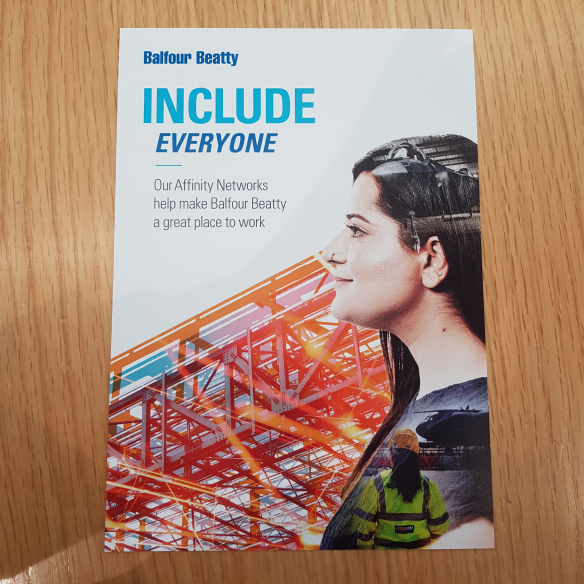By Ebunola Adenipekun, Business Disability Forum
“Try to do a few things really well” and “Think about the range of access to networks” were just two of the many take-aways at Business Disability Forum’s latest construction roundtable, this time focused on employee networks and held at Balfour Beatty earlier this month.
If businesses wonder what the benefits are of creating employee networks, they include: helping create a diverse workplace and talent pipeline, belonging for employees, increasing awareness, a place to provide expertise and peer support.
Balfour Beatty kicked off their presentation on the day with an explanation of their Allies Affinity Network which includes gender equality, multi-cultural and multi-racial, LGBTQ+ and disability – and how they intersect. The different networks often ally up and provide back up for business cases and programs.
Sam Pierce and Natalie Parker from Balfour Beatty explained the process for setting up the employee network: “When you set up your network, establish interest from within your organisation. Think of a great name! Consider the structure that the network will take and how many meetings you will need to hold, think about the communications you’ll need to send out to your organisation and the budget you’ll need. Secure senior leader support and if you can set up a launch, it’s great if you can link it to an existing event or awareness day.”

Balfour Beatty has a range of employee networks
Strategy must always be a key factor in creating an employee network: get a clear plan of who, what, and how the network will positively affect the organisation. Who should the network include? Balfour Beatty encourages inclusivity, inviting allies, as well as those who identify with the protected characteristic. How will the network meetings take place via members, employees, external parties?
The attendees at the roundtable also discussed how workers on sites might not feel they can tap into employee networks, especially if they are contractors or sub-contractors and not employed directly, but came to the conclusion that it is about educating all of the labour force and supply chain that employee networks can include them!
Indeed Emilia Hardern from Network Rail stated that her organisation was one of the first to invite supply chains and external partners to join their employee networks – so do consider them in the process of forming them if you work in the construction industry.
Emilia also talked about the number of lives that are positively affected by the networks and the opportunity it provides to affect the commercial aspect of business. If employees felt listened to and their needs addressed, this creates better morale and productivity.
Jodie Greer from Shell shared that her approach for her disability-focused employee network Enable was targeted at people who say “it’s not for them”. “That’s exactly who it’s for!”. Jodie herself doesn’t have a disability but wanted to be part of a network that affected change and positive solutions: “If you can change a culture, disability awareness will come.”
Throughout the day, attendees were really keen to pose questions on how they could start implementing employee networks as they were at different levels on the journey and different organisations had useful tips to get the ball rolling such as creating an action plan and partnering with other organisations. Indeed, Balfour Beatty thanked Business Disability Forum for the help it received in setting up its employee network around disability – and Karan Snuggs, Business Disability Partner at Business Disability Forum thanked all who attended.
The day finished with Karin O’Donnell at DWP sharing their processes for networks, and the role that networks play in creating an inclusive environment and helping shape the strategic plan – and how this might help the construction industry think about how they set up their networks.
A networking session rounded off the event and delegates left with another take-away: the role that employee networks play should be driven with SMART objectives to ensure the benefits can be measured.
To find out more about how to attend our networks and taskforces, go to businessdisabilityforum.org.uk/our-services/our-taskforces, and if you are interested in becoming a Member, find out more at businessdisabilityforum.org.uk/membership


